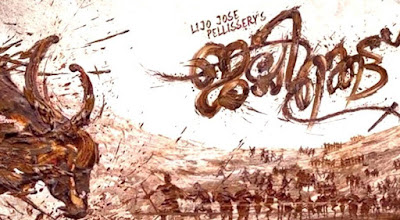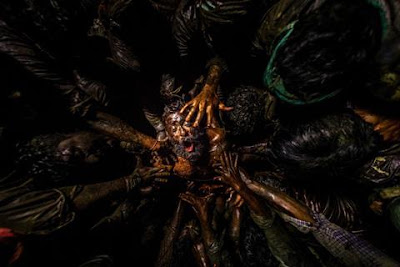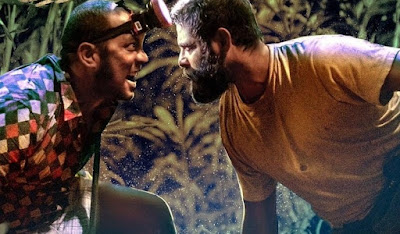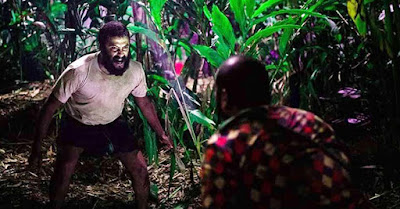by George Orwell (novella, 1945)
Jallikattu movie review rating: Four stars out of five
How much provocation does it take to make beasts out of men? When does the hunter become the hunted? When does the mask of thousands of years of a civilized upbringing come off? What is the breaking point?
In Lijo Jose Pellissery’s stark, spear-savage, beastly, consistently fascinating and mind-slitting insightful 90-min Malayalam movie Jallikattu, all it takes is a runaway buffalo for village men to lust after its meat, and plunge screaming into the despair of their own darkness even as the chase gets frenzied and increasingly barbaric, much like the recent mob lynchings in India.
As in all great movies, the messaging of Jallikattu culminates in unexpected ways, rather than anything preachy. Girish Gangadharan’s cinematography is a night shoot masterclass. How lanterns, trees, undergrowth is used, as are landscapes, uphill and downhill geographies used is awe-inspiring.
The main push-point of Jallikattu, is animalistic in a way. The conflict begins with two assistants of the local butcher fighting. The crux of it is a woman – One ends up marrying the girl, the other was rejected by her. At a point, it is like two male wolves scraping against each other for the female.
‘Fighting like animals’ takes a literal shape here, as males fight to relentlessly pull one down. A male on the verge of ‘victory’, brazenly tries to force himself on a woman, and after some resistance, almost animal like, the woman accepts his dominance.
Jallikattu story
Jallikattu is a traditional 2000-year-old sport predominantly existent in rural Tamil Nadu where many men try to tame a bull released into a large open enclosure, an act associated with raw masculinity.
In the movie, a mob frenzy erupts in a Kerala village, when a buffalo escapes the clutches of the local butcher Varkey (Chemban Vinod Jose) and leaves a trail of destruction.
Most men of the village burst in screaming, angry groups to catch the elusive animal, but as the chase stretches out for hours, the demons within each of the collected men are revealed, leading to a monstrous heap of a climax.
Visual treat
Along with Super Deluxe, Jallikattu is easily one of the Indian movies of the year. It begins with a series of two-second cuts of various pairs of human eyes opening, followed by a wide shot of a supposedly calm forest with distant flickering lights.
The mini edit cuts are (especially) admiringly used in a mercilessly sharp sequence of killing an animal, chopping and hanging up its meat, followed by men thronging at the butcher. These scenes made me forget that these were human characters, a recurring touch the movie emanates from – growls, brutality, screams, quarrels, stabbings, forceful lust and other barbarous mannerisms usually identified with wild creatures.
Straight, unwavering, deliciously beastly
Great cinema is often about various elements coming together in a textured richness of audiovisual flow.
In Jallikattu, Gireesh Gangadharan’s cinematography, the R. Jayakumar and Hareesh S.screenplay, the brilliant ensemble cast (Antony Varghese, Sabumon Abdusamad, Santhy Balachandran and others), Prashant Pillai’s effective (if not brilliant) background score and director Lijo Jose Pellissery’s assured, reined direction of the insane crowd and chase scenes, make this a mini masterpiece.
Dear cinema lovers, Jallikattu is your ticket to stark, rough yet necessary cinema, and like the best movies ever made, breathing with stabbing truths and goring horns to our insane, disorderly times.
by William Golding (novel, 1954)



